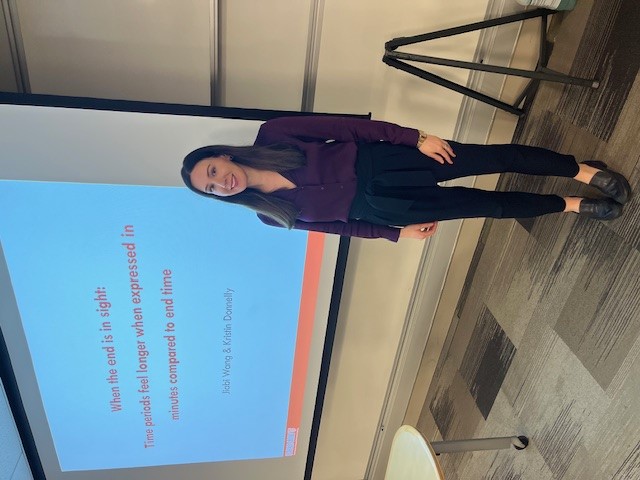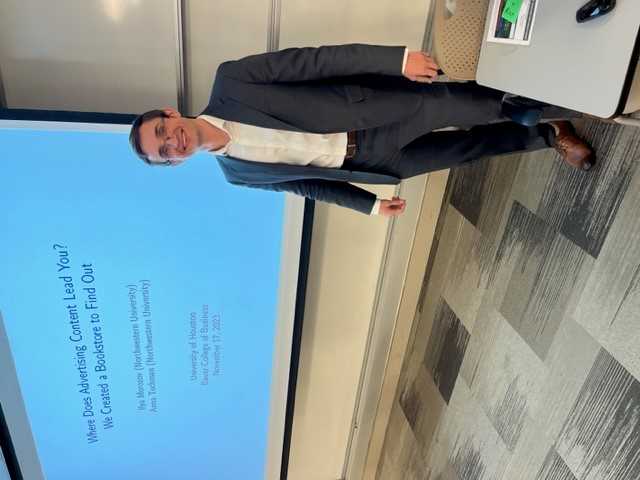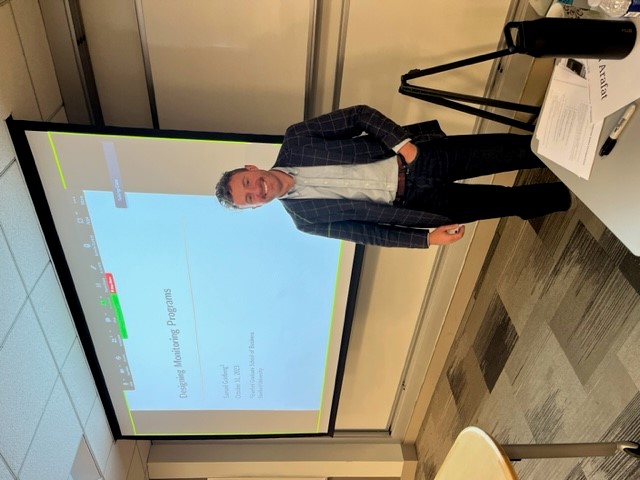|
Date
|
Speaker
|
Topic
|
Faculty Host
|
12/1/2023
Melcher Hall 365A
11:00 AM - 12:30 PM
|
Kristin Donnelly
University of Chicago
|
The End is in Sight: Framing Periods by Duration Makes Them Feel Longer
-
Click to read Abstract
Time periods are frequently described by either duration or endpoint. Extant relevant research only involves periods that span weeks, months or years (LeBoeuf et al., 2006 Read et al., 2005), yet many of consumers' routine experiences involve shorter time horizons. For example, assuming a current time of 6pm, you might learn that your table will be ready “at 6:30”, or “in 30 minutes”. Do these descriptions feel the same? Across thirteen pre-registered experiments, we find that time periods are perceived as longer when described by their duration (e.g. 45 mins, assuming a current time of 2:00pm) rather than their endpoint (e.g. 2:45pm). Reflecting this, participants anticipated being able to complete more things during a period when it was described by duration (compared to endpoint). Moreover, we demonstrate that describing waiting periods by duration reduces participants' willingness to wait and increases their willingness to pay to reduce the wait.
|
Byung
|

|
11/17/2023
Melcher Hall 365A
11:00 AM - 12:30 PM
|
Ilya Morozov
Northwestern University
|
Where Does Advertising Content Lead You? We Created a Bookstore to Find Out
-
Click to read Abstract
We study how advertising content influences consumers' decisions. To this end, we create a simulated online bookstore that imitates a real online shopping experience. We then conduct a pre-registered and incentive-compatible experiment in which we randomly expose store visitors to display ads, randomizing both advertising exposures and content. We find that ad content plays a major role in shaping advertising effects. Ads that reveal the book's attributes generate substantial effects on search and choice, over and above the impact of ads that do not reveal these attributes. Ads that call attention to a book's low price reveal that the book is less expensive than consumers thought, universally increasing demand for the advertised book. By contrast, ads that highlight the book's genre induce some consumers to search and buy the book but lead others to reject this option without search. These polarized responses may increase or decrease the total number of searches and purchases of the advertised book depending on the share of consumers who favor the revealed genre. Overall, our findings suggest that advertisers should carefully choose which product attributes to reveal in their ad copies.
|
Sesh Tirunillai
|

|
11/3/2023
Melcher Hall 365A
11:00 AM - 12:30 PM
|
Sam Goldberg
Stanford University
|
Designing Monitoring Programs
-
Click to read Abstract
I study the design of voluntary consumer monitoring programs in auto-insurance, using data from more than 2 million unique drivers. Monitoring technology tracks driving behaviors and provides performance incentives for improved driving, in the form of discounts on future premiums. The efficacy of these programs depends on who chooses to participate and their ability to influence driver risk. Because drivers anticipate performance incentives when making their participation decision, these goals are fundamentally tied. I estimate a model with both selection and moral hazard using unique variation in both performance and participation discounts. Through the lens of the model, I non-parametrically recover the joint distribution of drivers risk characteristics. I use my model to perform two counterfactuals of interest. First, I
separate the screening and risk adjustment effects and estimate the welfare of monitoring programs in this setting. Second, I use my model to examine counterfactual incentive schemes that illustrate how different incentive structures screen different drivers in and out of the program.
|
Bowen
|

|
10/20/2023
Melcher Hall 365A
11:00 AM - 12:30 PM
|
Kathy Li
UT Austin
|
Causal Inference in Marketing: Learning from Quasi-experiments
-
Click to read Abstract
Marketing researchers are interested in understanding causal relationships in a variety of contexts. While randomized experiments are the gold standard for establishing causality, they are often not feasible. In such cases, marketing researchers can leverage quasi-experimental data and methods to still establish causality. In the last two decades, there has been a renaissance in the development and improvement of quasi-experimental methods for understanding causal relationships. In this presentation, I will present an overview of recent developments in the quasi-experimental methods and their marketing applications. Specifically, I will focus on my contributions to the literature including developing the inference for popular methods such as the synthetic control method and the factor model methods (aka the generalized synthetic control method) and proposing new methods such as the Augmented Difference-in-Differences method and Forward Difference-in-Differences method. I will also discuss how to formally check identifying assumptions and how to choose the appropriate quasi-experimental method based on the data characteristics of the research problem.
|
Bowen
|

|
4/15/2023
UH Hilton
8:00-5:00
|
|
The 40th UH Marketing Doctoral Symposium
|
|
4/14/2023
UH Hilton
4:00-6:00
|
|
The 40th UH Marketing Doctoral Symposium
|
|